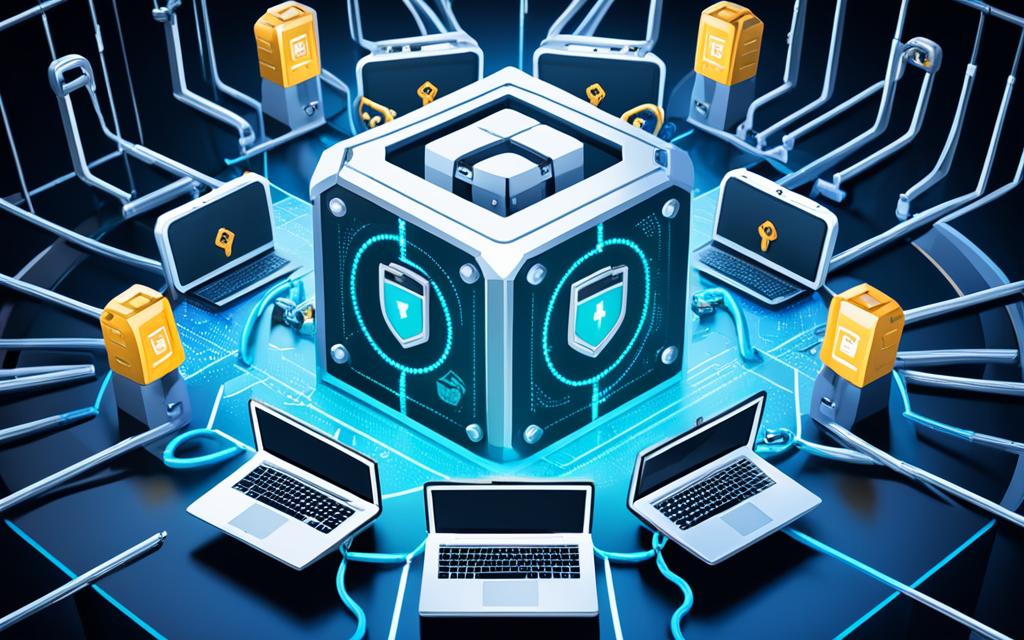Table of Contents
In today’s world, sharing data safely is crucial. Organizations need to keep their data safe while still working together effectively. This is where blockchain technology makes a big difference.
Blockchain is a way to share data that’s both decentralized and transparent. Large organizations like IBM, UNICEF, and Walmart have changed how they share data by using blockchain. It keeps the data safe and accurate1.
One big feature of blockchain is how it agrees on what data is valid. It uses things like Proof of Stake and Proof of Work. These are used by Ethereum and Bitcoin to make sure data sharing is secure and everyone can trust it1.
Using digital ‘fingerprints’ called cryptographic hashes, blockchain makes sure data is real. These act as seals of approval, checking the data is the same as when it was first shared. It uses special codes for protecting the data, so only the right people can see it1.
Blockchain links data together, creating a strong chain. This makes the data unchangeable by anyone who shouldn’t be changing it. It means data sharing can be trusted without the need for middlemen1.
Key Takeaways:
- Blockchain technology is all about safe and clear data sharing, helping many types of businesses.
- Methods like PoS and PoW make sure data sharing is safe on big blockchain networks.
- By using special codes and ‘fingerprints’, blockchain keeps data safe and only for the right eyes.
- The chain structure in blockchain means the data can’t be changed by outsiders, which removes the need for go-betweens.
Understanding Blockchain Technology
Blockchain technology is changing how we share and manage data. It uses a decentralized ledger. This means data integrity improves and security gets better. Businesses that understand blockchain can use it for safe and clear data sharing.
Blockchain is special because it doesn’t have a central control. Traditional databases do. Instead, it has many computers that work together. This setup is called a decentralized ledger. It makes it hard to change or cheat the data. So, information is more secure and trustworthy.
Blockchain makes data sharing safe by using encryption and agreement methods. It uses special codes to protect sensitive data. This security makes it tough for hackers to mess with the information. So, businesses can share data without worry, helping them innovate2.
Sharing data through blockchain improves how customers feel. It lets businesses learn what customers like. This helps companies make products and services just right for them. This improves how happy and loyal customers are. So, businesses can connect better with customers and give them personalized services2.
Blockchain is big on showing exactly what happens and protecting data. It makes a ledger that can’t change or be deleted. This makes all dealings visible and stops bad actions. The unchangeable ledger on blockchain keeps data integrity high. This builds trust and is great for safe sharing23.
Blockchain helps with better handling of data through special protections and controls. These let companies lock up their data well. They also decide who sees important information. Using blockchain can make managing data simpler and more accurate23.
To wrap up, knowing about blockchain is key for businesses wanting to share data safely and clearly. It aids collaboration, ensures security, betters customer experiences, and enhances data management. By using blockchain, companies can safeguard data integrity. This helps them innovate and lead in their fields.
Enhancing Data Security
Blockchain technology changes how we keep data safe. It uses special features and tools to protect important info. By not storing data in one easy-to-attack place, it keeps it safer4.
This tech uses strong math to protect data from being stolen. Only people with the right digital keys can see it. This makes it much harder for bad actors to get hold of critical data5.
Once data is on a blockchain, it’s locked tight. This makes it nearly impossible to change without being noticed. So, it keeps data from being messed with5.
Blockchains also keep things in the open. Everyone can see the data, but only the right people can actually use it. This makes data dealings more honest and safe45.
Using smart contracts makes things even safer. They check if each deal meets the agreed rules. This means fewer mistakes or scams, improving overall data safety5.
Deriving from its features, many areas now trust blockchain. Sectors like healthcare and finance see big benefits in using it. It makes sharing information easier and more secure, leading to a better digital future465.
Benefits of Blockchain for Secure Data Sharing
Blockchain tech brings lots of pluses for keeping data safe. It’s changing many fields for the better. It boosts trust, security, and transparency. Plus, it makes things work smoother and cost less. Blockchain is a key player in today’s digital world.
One big up of blockchain is better data traceability in business networks. This cuts costs and makes things work better. It uses distributed ledgers to keep all records the same everywhere. This gives full transparency and immutable records. No one can change the data, which builds trust and lowers fraud risk78).
Blockchain also boosts data security with its special records. It gets rid of the middleman, reducing errors and costs78). With tight control over who can see data, organisations can keep their info private. This is super important in fields like healthcare, ensuring data stays safe8.
It’s also great at quick tracking of data. It shows exactly where things have been and where they come from. This is key in food safety and tracking sources of contamination fast7. It’s a big help in finance too, making processes faster and more efficient7.
Blockchain is used widely, showing its many benefits for keeping data safe. In health, it secures sharing patient data while ensuring privacy78). It helps pharma stop fake products and make supply chains safer7. Governments use it to better protect data and win public trust78). Insurers use it to automate tasks, fight fraud, and share data quickly and correctly7.
By using blockchain, companies can make data sharing much safer and efficient. This tech is changing industries and creating more trust in our digital world. It helps improve how data is handled, leading to a future where sharing data is both safe and honest.
Blockchain Technology for Interoperability
Blockchain tech has changed how we share and manage data. It’s big on security and transparency across industries. A cool thing about it is how it makes different systems talk to each other safely. This is key for trustworthy and secure data sharing.
It guarantees enhanced security which means data is super safe from hackers. It keeps personal info from getting into the wrong hands9. By cutting out the middlemen, blockchain makes a solid, unchangeable record of transactions. This process helps prevent data leaks.
Blockchain doesn’t just beef up security. It also lets everyone involved keep an eye on things through shared records. This boost in openness builds trust and teamwork among different groups9. Now, everyone can see what’s going on, which makes for safer data swapping.
Yet, security is just the beginning of what blockchain brings to the table. It’s a wizard at keeping data spot-on, thanks to many checks on each transaction9. Mistakes and tricks that sneak into other systems are less likely with blockchain.
With blockchain, sharing data gets quicker and simpler. You don’t need go-betweens to get to the facts. This direct link to shared records cuts down the wait time and makes things run smoother9. Plus, fewer steps mean less money wasted on formalities.
Its decentralized nature is what really makes blockchain gel so well with different tech. No single boss oversees the whole show. So, no matter what, you can usually get to your data safely. This teamwork among systems helps with even more secure and easy data swaps9.
Blockchain is getting its time in the spotlight in all kinds of fields. It’s a hit in supply chains, healthcare, protecting rights, managing ID info, and more9. In these areas, it offers a reliable way to keep everyone in the loop without risking security.
| Applications of Blockchain in Data Sharing |
|---|
| Supply Chain Management |
| Healthcare Data Sharing |
| Intellectual Property Rights Protection |
| Digital Identity Management |
| Sharing Economy Platforms |
| Government Services |
In the end, blockchain is a game-changer for safe and smooth data sharing. Its top-notch security, clearness, and data quality make sharing between different places easy and safe9. Not only does it make things safer, but it spares heaps of money and time too.
Decentralization and Interoperability
In today’s world, decentralization and interoperability are key in the blockchain space.
Blockchain’s setup allows safe and clear sharing of data over many systems. This change is seen in many areas, especially in healthcare.
Healthcare teams gather lots of patient info, but it’s kept in different systems. This makes it hard to give the best care or do research well.
With blockchain’s help, health groups can easily look at patient info from different places. This makes care and research much better.

Blockchain lets healthcare pros see a patient’s full health story. They can check diagnoses, treatments, and meds, no matter where the info is stored.
Seeing all the data in one place means less repeat tests, less paperwork, and safer care.
Numbers from many places show how important decentralization and working together in blockchain are.
Source10 tells us there are over 100 layer-1 blockchains and more layer-2 and layer-3 networks growing. These let apps work with different blockchains. They cover things like trading, lending, digital art, and running organizations.
Bridges for tokens are vital in moving assets between chains. They use methods like locking and creating new tokens, or burning old ones to release new ones.
There are also ways for different blockchains to talk to each other, like swapping tokens or making payments. This makes sharing info and assets easier in the blockchain world.
References:
chain.link,
gemini.com,
vezgo.com
Smart Contracts for Automated Processes
Smart contracts are key in making processes automated. They change how deals are done and managed. With no need for middlemen, everyone involved can be sure of the results right away.
These contracts work on “if/when…then…” rules. They run on a computer network when set conditions are reached. This speedy, automatic way to handle deals cuts down on mistakes and fights.
The pluses of smart contracts are many. They’re quick, save time, and make deals happen exactly as planned. Without middlemen, trust, clarity, and safety in deals improve. Businesses also save a lot by cutting out manual deal checks.
Behind smart contracts is blockchain technology. It uses strong codes to make sure deals are secure. It’s great for tracking important items, like medicines that need chill storage, making sure they stay safe and get where they should.
Big companies like The Home Depot have seen smart contracts work well. They’ve used them to solve problems fast with their sellers. Also, they help to see clearly through the whole chain of supply — and build better bonds with their partners.
Then, there’s we.trade and others. These platforms build trust networks. They make trading better and more secure for companies and banks working across the globe. Thanks to smart contracts, doing business becomes more efficient and safe.
Keeping the supply chain clear, finance smooth, and food safe is what blockchain apps focus on. They use smart contracts to get the job done.
| Benefits of Smart Contracts | Statistical Data11 |
|---|---|
| Speed, efficiency, and accuracy | |
| Trust, transparency, and security | |
| Cost savings by removing intermediaries |
| Smart Contracts in Industries | Statistical Data12 |
|---|---|
| Supply chain management | |
| Financial sector | |
| Real estate transactions | |
| Healthcare | |
| Legal agreements |
Using smart contracts offers great pluses. But, getting them right comes with its own set of hurdles. Making sure they’re legally OK, well coded, and fit with your current systems are big tasks. Still, the chance to quicken and better your processes is a big deal for any business.
Use Cases Across Industries
Blockchain technology is changing many industries by making old ways better and introducing new, secure ways to work. It changes the game in finance, healthcare, government, energy, and how we manage supply chains. Now, let’s look at some important uses in these areas.
Finance
In finance, blockchain is big news. It’s all about secure and clear ways to store and move data. It cuts out the middle man and puts more power in people’s hands. Its uses in finance include global transactions, trade finance, DeFi, and making assets digital. The finance blockchain market is set to hit $32.69 billion by 202413.
Healthcare
Healthcare could really benefit from blockchain. It keeps medical records safe and shareable. This helps make health info right and easy for doctors to see. It’s also good for sharing trial data, tracking drugs, and managing patient info. By 2027, the healthcare blockchain market could grow a lot, about 71.8%1413.
Government
For governments, blockchain means better security, clear actions, and efficiency. It could change voting to make sure elections are fair and solid. Plus, it could stop fake identities. Right now, lots of central banks are thinking about blockchain for money and payment systems, to cut costs and up the game in the government sector13.
Energy
In the energy world, blockchain is doing big things. It’s helping make local energy networks smarter and more efficient. This tech keeps energy exchanges honest and lets people trade energy directly. By using blockchain, the energy sector could get a lot more efficient and green15.
Supply Chain Management
For managing supplies, blockchain is a hero. It makes sure goods are tracked safely, cutting down on fakes and scams. This tech checks where things come from and makes sure they’re real and honest. Using off-chain analytics means knowing even more about the supply chain, which helps it work better and stay true15.
There’s lots more blockchain can do across various fields. It’s clear this tech will keep growing, bringing new chances and ways to work. Expect more improvements and chances as more groups and businesses use blockchain.
Challenges and Future Directions
Blockchain technology has seen a rise in many fields. However, it still faces some key challenges.
1. Scalability
Scalability is a big hurdle for blockchain. When more transactions occur, the network can slow down. This leads to longer transaction times and higher costs.
There are steps to tackle this, like creating off-chain and sidechain solutions. These aim to ease the pressure on the main blockchain.
2. Energy Consumption
Energy use is another issue for blockchain. It needs a lot of power to validate transactions and keep the ledger secure. This issue gains more attention as sustainability concerns grow.
Efforts are being made to develop greener consensus methods and energy sources for blockchains.
3. Regulatory Concerns
The laws around blockchain are still evolving. Governments are figuring out how to handle privacy, security, and financial rules. This process creates a maze of legal challenges for blockchain.
It’s crucial for policymakers and blockchain experts to work together. They need to build guidelines that spur innovation while meeting legal requirements.
Future Trends
Yet, the future for blockchain looks bright. It stands ready for significant growth, shaped by key trends:
- Integration with Artificial Intelligence (AI): Linking blockchain with AI could transform many fields. It would help make data sharing more secure, boost AI precision, and create AI markets that are decentralized.
- Hybrid Blockchains: Models that mix public and private blockchains are becoming more popular. Hybrid blockchains offer better privacy, scalability, and adaptability, making them versatile.
Table: Future Trends in Blockchain Technology
| Trend | Description |
|---|---|
| Integration with AI | Combining the power of blockchain and AI to create innovative solutions. |
| Hybrid Blockchains | Blending the benefits of public and private blockchains for enhanced functionality. |
Blockchain technology is moving forward by overcoming current hurdles and embracing new directions. Its ability to enable secure data transfers and spark innovation across sectors is vast16.
Conclusion
Blockchain technology is changing the way organisations worldwide share data securely. It uses advanced math to keep information safe from tampering and sneaky looks17. It doesn’t need go-betweens, which cuts down on the chances of cheating17.
This tech has a big future. Experts think it might be used by 80% of the world in the next ten years18. It can make tracking products and money movements easier to follow18. Also, in banking, it could make sending money faster and cheaper by cutting out the middlemen18.
But, using blockchain tech can be hard. It needs people who really know their stuff to get it right18. To keep it safe, organisations must understand how to use the special security features it offers19.
In short, blockchain boosts security and trust in data sharing17. Now more than ever, keeping data safe is vital. By using blockchain, organisations can work together better, streamline how they work, and protect their data. This helps make our digital world safer and more connected for the future.
FAQ
What is blockchain technology?
Blockchain technology is like a big, shared book kept by many people. It makes sure data is safe and open thanks to its setup. This system works on being clear, unchangeable, and hiding info with special codes.
How does blockchain ensure data security?
It gets rid of one weak spot for safety by spreading data over many. With super smart codes, it locks data tight and stops sneaky attacks or looks. This way, only the right people get in.
What are the benefits of using blockchain for secure data sharing?
Blockchain’s perks for safe data are many. It keeps info true and untouched, cuts out the middlemen, and keeps messages secret. Plus, checking who did what is easy and clear.
How does blockchain enable interoperability?
Through blockchain, data safely flows between many parts. This makes things work together better and trust grows. Everyone involved knows what’s happening, thanks to the open record.
How can blockchain benefit the healthcare sector?
In health, blockchain links up patient info across places. This means better care and less fuss with paperwork for everyone.
What is the role of smart contracts in blockchain technology?
Smart contracts run things without middlemen and stop mistakes. They’re key for jobs like keeping a close eye on goods moving around without lots of people checking all the time.
Can you provide examples of blockchain use cases in different industries?
It fits many jobs well. For money stuff, it speeds up moving cash between lands and makes checks easier for who’s getting loans. In health, it links tests and treatments, and in products, it ensures they’re really what they say they are.
What are the challenges and future directions of blockchain technology?
Getting bigger, greener, and following rules better are things to work on. But smart heads are busy making it work even better. They want to mix in clever machines and new kinds of sharing books.
Source Links
- https://www.blockchain-council.org/blockchain/how-blockchain-technology-help-organizations-when-sharing-data/ – How does Blockchain Technology Help Organizations when Sharing Data? (Updated in 2024)
- https://www.linkedin.com/pulse/how-does-blockchain-technology-help-organizations-when-sharing – How does Blockchain technology help organizations when sharing data?
- https://coinswitch.co/switch/crypto/how-does-blockchain-technology-help-organizations-when-sharing-data/ – How Does Blockchain Technology Help Organizations In Sharing Data?
- https://www.mobihealthnews.com/news/contributed-blockchain-healthcare-and-enhancing-security-and-transparency – Contributed: Blockchain in healthcare and enhancing security and transparency
- https://www.smdailyjournal.com/sponsored/how-b2b-data-sharing-can-be-improved-with-blockchain-technology/article_bd4520c2-74dd-11ee-8c47-3b2ad13bdb8d.html – How B2B data sharing can be improved with blockchain technology
- https://www.mckinsey.com/capabilities/mckinsey-digital/our-insights/using-blockchain-to-improve-data-management-in-the-public-sector – Using blockchain to improve data management in the public sector
- https://www.ibm.com/topics/benefits-of-blockchain – What are the Benefits of Blockchain? | IBM
- https://medium.com/@kumarpre31/how-does-blockchain-technology-help-organization-when-sharing-data-cb02c773af4d – How does Blockchain Technology Help Organization When Sharing Data
- https://www.geeksforgeeks.org/how-does-blockchain-technology-help-organizations-when-sharing-data/ – How does Blockchain Technology help organizations when sharing data? – GeeksforGeeks
- https://chain.link/education-hub/blockchain-interoperability – What Is Blockchain Interoperability? | Chainlink
- https://www.ibm.com/topics/smart-contracts – What Are Smart Contracts on Blockchain? | IBM
- https://www.linkedin.com/pulse/smart-contracts-automating-business-processes-blockchain-arnold-hayes-x4ixc – Smart Contracts: Automating Business Processes with Blockchain Technology
- https://www.spydra.app/blog/top-10-blockchain-technology-use-cases-you-should-know-in-2024 – Spydra Blog | Top 10 Blockchain Technology Use Cases You Should Know in 2024
- https://www.ulam.io/blog/exploring-blockchain-use-cases-across-industries – Exploring Blockchain Use Cases Across Industries
- https://spaceandtime.io/blog/17-real-world-use-cases-for-blockchain-technology – Space and Time Blog | 17 Real-World Use Cases for Blockchain Technology
- https://www.mdpi.com/1999-5903/14/11/341 – Blockchain Technology: Benefits, Challenges, Applications, and Integration of Blockchain Technology with Cloud Computing
- https://www.thekaizenglobal.com/how-does-blockchain-technology-help-organizations-when-sharing-data – How does blockchain technology help organizations when sharing data?
- https://www.institutedata.com/us/blog/blockchain-technology-explained/ – Blockchain Technology: Revolutionizing Your Organization’s Security and Transparency | Institute of Data
- https://www.ibm.com/topics/blockchain-security – What Is Blockchain Security? | IBM












